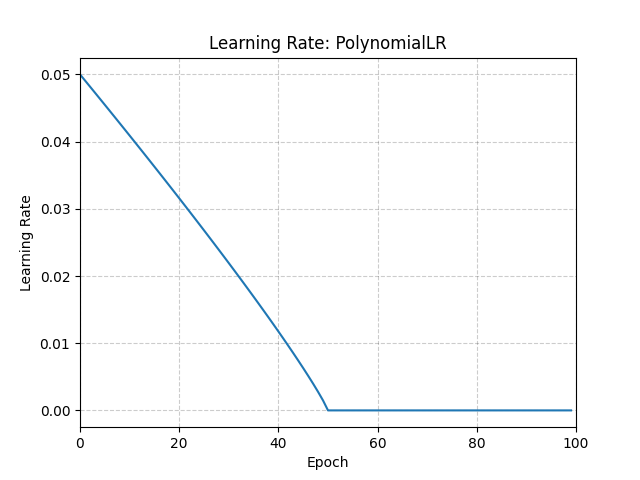PolynomialLR#
- class torch.optim.lr_scheduler.PolynomialLR(optimizer, total_iters=5, power=1.0, last_epoch=-1)[source]#
Decays the learning rate of each parameter group using a polynomial function in the given total_iters.
When last_epoch=-1, sets initial lr as lr.
- Parameters:
Example
>>> # Assuming optimizer uses lr = 0.05 for all groups >>> # lr = 0.0490 if epoch == 0 >>> # lr = 0.0481 if epoch == 1 >>> # lr = 0.0472 if epoch == 2 >>> # ... >>> # lr = 0.0 if epoch >= 50 >>> scheduler = PolynomialLR(optimizer, total_iters=50, power=0.9) >>> for epoch in range(100): >>> train(...) >>> validate(...) >>> scheduler.step()

- get_last_lr()[source]#
Get the most recent learning rates computed by this scheduler.
- Returns:
A
listof learning rates with entries for each of the optimizer’sparam_groups, with the same types as theirgroup["lr"]s.- Return type:
Note
The returned
Tensors are copies, and never alias the optimizer’sgroup["lr"]s.
- get_lr()[source]#
Compute the next learning rate for each of the optimizer’s
param_groups.Scales the
group["lr"]s in the optimizer’sparam_groupssuch that the learning rates followReturns the current learning rates unchanged after
total_itersis reached.- Returns:
A
listof learning rates for each of the optimizer’sparam_groupswith the same types as their currentgroup["lr"]s.- Return type:
Note
If you’re trying to inspect the most recent learning rate, use
get_last_lr()instead.Note
The returned
Tensors are copies, and never alias the optimizer’sgroup["lr"]s.
- load_state_dict(state_dict)[source]#
Load the scheduler’s state.
- Parameters:
state_dict (dict) – scheduler state. Should be an object returned from a call to
state_dict().
- state_dict()[source]#
Return the state of the scheduler as a
dict.It contains an entry for every variable in
self.__dict__which is not the optimizer.
- step(epoch=None)[source]#
Step the scheduler.
- Parameters:
epoch (int, optional) –
Deprecated since version 1.4: If provided, sets
last_epochtoepochand uses_get_closed_form_lr()if it is available. This is not universally supported. Usestep()without arguments instead.
Note
Call this method after calling the optimizer’s
step().

